Wtf, what a year, eh? At least those of us who made it through… made it through. Just a few closing thoughts before that ludicrously pointless ball of Christmas tree lights falls, signaling the arbitrary beginning to another great year.
Economy. At the end of a tumultuous year, we are still at nearly 10% unemployment as it is currently calculated, meaning that it’s probably closer to 16% in real terms, maybe higher. I can tell you that, of the family members and close friends who have lost a job in the past year to 18 months, 2 out of 3 are still looking for work. This is probably a familiar story across the country. And yet, some seem to be doing quite well. American businesses – and I mean BIG businesses – have amassed huge piles of cash over the past year. The stock market – and therefore, investors – are doing better. And on Wall  Street, the bonuses were fatter than a Christmas goose once again. (They’ve got a tax cut on the way, too.) Even with all that, they managed to take a swipe at Obama, who has done little more than wag a finger at them. There’s gratitude for you.
Street, the bonuses were fatter than a Christmas goose once again. (They’ve got a tax cut on the way, too.) Even with all that, they managed to take a swipe at Obama, who has done little more than wag a finger at them. There’s gratitude for you.
War. Our glorious victory in Afghanistan was about nine years ago, one of the darkest winters I can recall, and the start of a long, bloody chapter in the history of American empire. Anything like the bloodiest ever? Likely not. It is just as well that we remember how many lives were lost in Korea in the early 1950s, in Vietnam in the 1960s and ’70s, in Central America and southern Africa in the 1980s, and elsewhere. Even individually, they make Iraq and Afghanistan seem like relatively minor catastrophes, though either of our most recent wars would put us into Milosevic territory (and probably beyond). Still, Afghanistan has the distinction of being our longest war, as well as one we should have known better than to ignite (happy as we were to help strand the Soviets there during the 1980s).
Social Programs. Despite (and partially because of) the new health insurance reform bill, this has not been a good year for the social safety net. Political players are positioning themselves to implement massive cuts in Social Security and Medicare/Medicaid over the coming two years. They’ve ginned up fear of the deficit, sapped the federal budget with Obama’s tax compromise, and set up the hurdles in advance, the first being the continuing budget resolution that will run out in March. Watch – that’s when they will bring out the long knives. We’d best be ready for them. Read Dean Baker’s excellent blog as well as Ezra Klein’s interview with James Galbraith, and start talking to your friends about this … yesterday.
Here’s to a better year next time around.
luv u,
jp

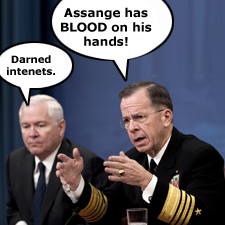 surprised by this? Iraq is a majority Shi’a country, like Iran. There are longstanding cultural, religious, and political ties between these two neighboring states, and many Iraqi political figures took exile in Iran during the Saddam years. Speaking of which, Iran was attacked by a U.S.-supported Iraq in the 1980s, in an eight-year conflict that cost them probably a million lives. If I were them, I would be deeply interested in what happens in Iraq…. especially since we’re still the power behind the throne.
surprised by this? Iraq is a majority Shi’a country, like Iran. There are longstanding cultural, religious, and political ties between these two neighboring states, and many Iraqi political figures took exile in Iran during the Saddam years. Speaking of which, Iran was attacked by a U.S.-supported Iraq in the 1980s, in an eight-year conflict that cost them probably a million lives. If I were them, I would be deeply interested in what happens in Iraq…. especially since we’re still the power behind the throne.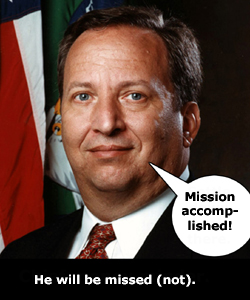 Imperial Prerogatives. There has been a lot of reporting on Pakistan the last couple of weeks. Their military closed a crossing to U.S. convoys on the Af-Pak border in response to a range of disagreements, not least of which are disputes over U.S. and NATO (essentially U.S.) incursions into Pakistani national territory. There is a kind of impatience to the reporting, communicating the administration’s and the military’s frustration with Pakistan’s failure to adequately support their seemingly endless war in Afghanistan. It’s reminiscent of the official line during the Vietnam war, when American officials would complain about “sanctuaries” in Cambodia and Laos, while they confidently flew devastating bombing runs out of their own “sanctuaries” in Thailand and elsewhere.
Imperial Prerogatives. There has been a lot of reporting on Pakistan the last couple of weeks. Their military closed a crossing to U.S. convoys on the Af-Pak border in response to a range of disagreements, not least of which are disputes over U.S. and NATO (essentially U.S.) incursions into Pakistani national territory. There is a kind of impatience to the reporting, communicating the administration’s and the military’s frustration with Pakistan’s failure to adequately support their seemingly endless war in Afghanistan. It’s reminiscent of the official line during the Vietnam war, when American officials would complain about “sanctuaries” in Cambodia and Laos, while they confidently flew devastating bombing runs out of their own “sanctuaries” in Thailand and elsewhere. The “Ground Zero Mosque” Controversy. This is an unexpected bonanza for jihadi recruitment. It validates much of the propaganda about an America at war with Islam. It demonstrates the depth of our political pathology and our willingness to scapegoat more than 1 billion people because of the actions of a handful of criminally insane zealots. And it does so at the worst possible time, when expectations in the Islamic world are already being deflated by Obama’s Bush-like foreign policy. Jihadi leaders hope that this controversy will drag on, I’m sure, or that the Park 51 center will be forced to relocate in Staten Island so that its detractors, flush with victory, will expand their campaign against Muslims.
The “Ground Zero Mosque” Controversy. This is an unexpected bonanza for jihadi recruitment. It validates much of the propaganda about an America at war with Islam. It demonstrates the depth of our political pathology and our willingness to scapegoat more than 1 billion people because of the actions of a handful of criminally insane zealots. And it does so at the worst possible time, when expectations in the Islamic world are already being deflated by Obama’s Bush-like foreign policy. Jihadi leaders hope that this controversy will drag on, I’m sure, or that the Park 51 center will be forced to relocate in Staten Island so that its detractors, flush with victory, will expand their campaign against Muslims. 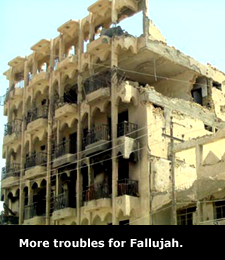 mortality rates in Fallujah have reached ridiculously high levels in the wake of the U.S. assault, very likely the result of our use of depleted uranium munitions. The casing materials from these armor-piercing shells caused untold misery in Iraq in the years following the Gulf War, during which time essential medical supplies were being withheld from them by virtue of U.S. /U.K. sanctions. (Cockburn’s colleague Robert Fisk tells the story in his book
mortality rates in Fallujah have reached ridiculously high levels in the wake of the U.S. assault, very likely the result of our use of depleted uranium munitions. The casing materials from these armor-piercing shells caused untold misery in Iraq in the years following the Gulf War, during which time essential medical supplies were being withheld from them by virtue of U.S. /U.K. sanctions. (Cockburn’s colleague Robert Fisk tells the story in his book 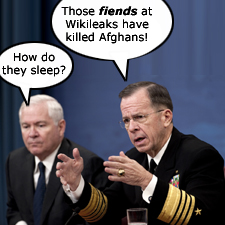 will pay a heavy price. Admiral Mullens went so far as to say that Wikileaks may already have blood on their hands. Mullens and his colleagues would know something about that, of course, as the documents apparently demonstrate. I suspect, in cases such as these, that most if not all of what is secret is merely a secret from us (i.e. the American people); that military operations of the kind deployed in Afghanistan are very porous in the sense of who is working for whom. Sure, it would be better not to put people needlessly in harm’s way. But that’s what the Afghan war is all about, from what I can see.
will pay a heavy price. Admiral Mullens went so far as to say that Wikileaks may already have blood on their hands. Mullens and his colleagues would know something about that, of course, as the documents apparently demonstrate. I suspect, in cases such as these, that most if not all of what is secret is merely a secret from us (i.e. the American people); that military operations of the kind deployed in Afghanistan are very porous in the sense of who is working for whom. Sure, it would be better not to put people needlessly in harm’s way. But that’s what the Afghan war is all about, from what I can see. Why the hell are we in Afghanistan? Our leaders say it’s to disrupt and destroy Al Qaeda so that they cannot plan new attacks on us. But to the extent that people like Osama Bin Laden are involved in operational planning for global terror attacks, all he and his pals need is a room (or a cave, but I suspect a room) big enough for a white board. Can anyone claim that we have denied him that in nearly nine years of war? Did our drones stop the Times Square bomber? (Fact is, they helped push him over the edge.) Where’s the story on that, kids?
Why the hell are we in Afghanistan? Our leaders say it’s to disrupt and destroy Al Qaeda so that they cannot plan new attacks on us. But to the extent that people like Osama Bin Laden are involved in operational planning for global terror attacks, all he and his pals need is a room (or a cave, but I suspect a room) big enough for a white board. Can anyone claim that we have denied him that in nearly nine years of war? Did our drones stop the Times Square bomber? (Fact is, they helped push him over the edge.) Where’s the story on that, kids?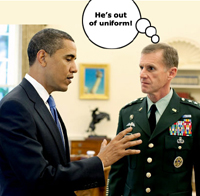 Most of the reporting on Afghanistan – the Rolling Stone article included – includes a kind of embedded imperial perspective. There’s an underlying assumption that we should be in Afghanistan, that there is some legitimacy to our enterprise there, and that it’s largely a matter of getting it right. This attitude is a formula for remaining in that country for the rest of any of our lives (particularly with respect to anyone who is sent to fight there). Unfortunately, our foreign policy is driven by domestic politics and the need for leaders to act “tough” and project an image of American exceptionalism. That is what makes generals like McChrystal so attractive to our leaders and the mass media that fawn on them (until they say the wrong thing).
Most of the reporting on Afghanistan – the Rolling Stone article included – includes a kind of embedded imperial perspective. There’s an underlying assumption that we should be in Afghanistan, that there is some legitimacy to our enterprise there, and that it’s largely a matter of getting it right. This attitude is a formula for remaining in that country for the rest of any of our lives (particularly with respect to anyone who is sent to fight there). Unfortunately, our foreign policy is driven by domestic politics and the need for leaders to act “tough” and project an image of American exceptionalism. That is what makes generals like McChrystal so attractive to our leaders and the mass media that fawn on them (until they say the wrong thing). Such obfuscation is more effective with today’s all-volunteer military, but back when the draft was running at full steam, it was a much harder sell. When you are literally forcing people to go to war, your praise tends to ring a bit hollow. Of course, our volunteer military is forced, technically speaking – they have no choice but to go, even if they merely joined up for the promise of college tuition. But unlike the 60s and prior, this is not a broadly-experienced phenomenon. Back then, masses of young people were threatened with deployment and particularly in the case of Vietnam, many were sent against their will. In that circumstance, there’s a strong incentive to examine the policy very closely. Many did, and didn’t like what they found.
Such obfuscation is more effective with today’s all-volunteer military, but back when the draft was running at full steam, it was a much harder sell. When you are literally forcing people to go to war, your praise tends to ring a bit hollow. Of course, our volunteer military is forced, technically speaking – they have no choice but to go, even if they merely joined up for the promise of college tuition. But unlike the 60s and prior, this is not a broadly-experienced phenomenon. Back then, masses of young people were threatened with deployment and particularly in the case of Vietnam, many were sent against their will. In that circumstance, there’s a strong incentive to examine the policy very closely. Many did, and didn’t like what they found.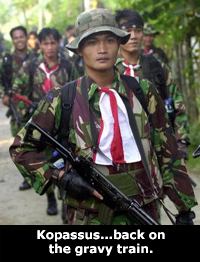 In a way, the U.S. empire is like this enormous killing machine. It’s got a thousand arms, colossal legs, and it moves across the face of the earth, crushing, grabbing, burning everything in its path. The president sits in a cockpit in its forehead and works the controls. Bush had a great time with it – invited his friends on board, and took it for a tear through Iraq. Then Obama took the helm. He promised to be more responsible. But … it’s still a killing machine, built to do only one thing. No matter what lever you pull, what button you press, it kills. So … he starts pulling, pressing, etc. Kopassus is on the other end of one of those levers, and he’s thinking seriously about pulling that one.
In a way, the U.S. empire is like this enormous killing machine. It’s got a thousand arms, colossal legs, and it moves across the face of the earth, crushing, grabbing, burning everything in its path. The president sits in a cockpit in its forehead and works the controls. Bush had a great time with it – invited his friends on board, and took it for a tear through Iraq. Then Obama took the helm. He promised to be more responsible. But … it’s still a killing machine, built to do only one thing. No matter what lever you pull, what button you press, it kills. So … he starts pulling, pressing, etc. Kopassus is on the other end of one of those levers, and he’s thinking seriously about pulling that one.